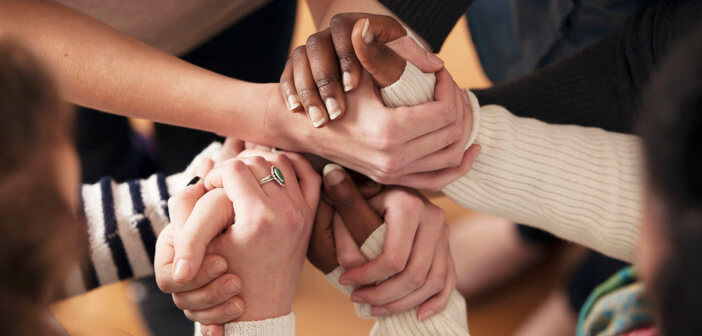Amy Valdez Barker says that the church should be a training center in the development of trust. She names practices that leaders can employ when groups come together to create environments that foster and facilitate a high-trust culture.
The church should be one of the primary training centers in building high-trust communities and high-trust cultures. Our faith in Jesus requires trust. The church should and must be one of the primary places where people can learn to trust, exercise trust, and become trustworthy because we trust God and God trusts us as partners in relieving human suffering.
The Christian church has a great responsibility to take risks that reinforce our trust in God. If we live in fear from broken trust, then we miss the wholeness of God’s vision for us and God’s vision for the world. In high-trust cultures, barriers are broken and walls come crumbling down. In high-trust cultures, people step across lines of divisions and become beacons of hope and life to those who are weary of trust. And when trust is broken by neighbors, faithful people rise up again because their whole trust is in God.
Practices that create trust
As church leaders prepare meetings, conferences, and small group gatherings, and are seeking to create environments that foster and facilitate a high-trust culture, there are a few practices to keep in mind. Consider these five practices adapted from Parker Palmer’s “Circles of Trust”:
- Create a space that is open, hospitable, welcoming, and safe. People are much more trusting when you have taken time to consider their safety, security, and needs in the environment in which they will gather.
- Be willing to really listen. People will trust you and trust the group when they believe that you aren’t trying to fix, advise, correct, or “save” them. As people of faith, we have to establish God as the ultimate creator and judge.
- Ask honest, open questions. When people feel free to wrestle with questions together, there is a gift of discovering more because we trust one another to explore a multitude of ideas. Creative ideas and innovation can be messy. Let them be messy and follow God through the refining process.
- Look at ideas and stories through a theological lens. Explore the intersection of universal stories of human experience with the personal stories of our lives in relation to the scriptures and our understanding of God. Let theology be intertwined in your gathering. Looking at ideas and stories through a theological lens helps us trust God as we learn to trust our neighbors.
- Use multiple modes of exploration and reflection. Keep in mind what ways people might digest information, wrestle with questions, and understand their roles and responsibilities as they engage one another in this community.
The church as a trust training center
When a church is a trust training center, it allows people to be honest with their fears, their beliefs, and their questions. We must not silence people because of our judgments or judge people’s souls back into hiding because we are unwilling to hear how their beliefs, attitudes, and understandings about life might be different from our own. Broken trust often stems from fear of our own truths. If we are honest with ourselves and with the people in our churches, we can engage in a conversation about truth that allows us to wrestle with what truth means for one person over the other. By wrestling with this together, we may discover the truth that the Holy Spirit needs us to see in order to grow closer to Christ through our honest engagement with our neighbors.
If honesty, integrity, and respect were built, practiced, and strengthened in every aspect of the church’s life, we would experience the core practices needed for repairing broken trust in our world.
This article is adapted from Trust by Design: The Beautiful Behaviors of an Effective Church Culture (Abingdon Press, 2017) by Amy Valdez Barker. Used by permission. The book is available at Cokesbury and Amazon.
Related Resources
- Trust is Results Driven by John W. Wimberly, Jr.
- Building Trust for Effective Team Ministry by Robert C. Crosby
- Credibility Essential for Leadership by Lovett H. Weems, Jr.







